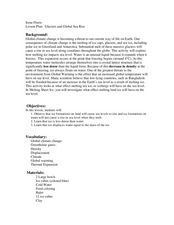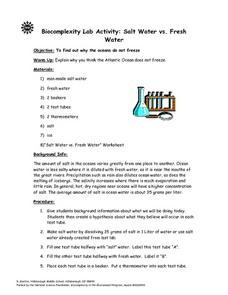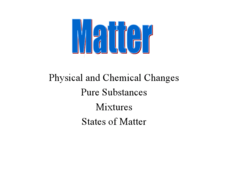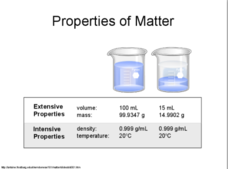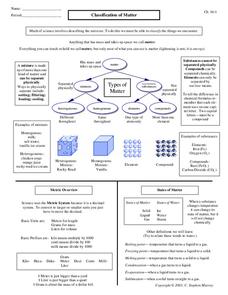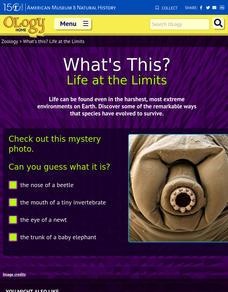Curated OER
Refrigeration Part 2 - How they work
Fourth graders investigate insulators and how refrigerators actually work to keep things cold through evaporation and pressure changes in the coolant. They create a box to keep an ice cube from melting, and observe a variety of...
Curated OER
Rising Sea Levels: UK and Bangladesh
Students explore the possible effects of global warming. In this geography/global warming lesson, students identify regions using an atlas and complete a global warming worksheet. Students perform an experiment in which they simulate...
Curated OER
Glaciers and Global Sea Rise
Students explain how melting glaciers affect global warming. In this earth science lesson, students investigate the change in ice density as it melts. They discuss the human and environmental impact of rising sea levels.
Curated OER
State Change
Eighth graders explore the physical change of matter. As a class, they discuss their favorite super hero and determine if the hero undergoes a physical or chemical change. Students examine the change of state and phase change. In groups,...
Curated OER
Cartoons for the Classroom: Al Gore Heats up a Debate
In this current events learning exercise, students analyze political cartoons about Al Gore's "An Inconvenient Truth." Students respond to 3 talking point questions.
Curated OER
Geography: examining the Glacial Features of Cape Cod
Young scholars examine satellite images of the glacial features of Cape Cod. They analyze where human activity is located in terms of those features. Students make models of the features, including kettle holes. They also use contour...
Curated OER
Ice Ain't Easy
Students are told that objects in contact with one another reach an equilibrium temperature. A hot object placed in a cool liquid always cool off. It never happens that the object gets hotter and cool liquid gets colder. Students predict...
Curated OER
Salt Water vs. Fresh Water
Students explore why the oceans do not freeze. They explain why they think the Atlantic Ocean does not freeze. Students are given background information about what they are doing. They create a hypothesis about what they believe...
Curated OER
Law of Conservation of Mass
Students work in small groups. They grab a handful of ice, and place the ice in an empty beaker of ice using a triple beam balance. Students heat up the beaker of ice over a hot plat until the ice has changed into water. They measure...
Curated OER
Icebergs Ahead!
Young scholars examine icebergs and how they are suspended in water, why ice floats, the melting process of an iceberg, and the floating behavior of ice compared to that of a cork through a lab activity.
Curated OER
Rain Formation
First graders investigate the different water formations by conducting an experiment. In this water properties lesson, 1st graders examine jars filled with ice, rain water, air and snow in their class. Students predict what...
Curated OER
State of Matter - Atoms
Learners examine and discuss how atoms change from solid to liquid to gas. They inflate a balloon by melting ice that converts to steam, and discuss the results.
Curated OER
Energy Conservation
Third graders discuss four points related to conservation. They work in groups to design a package to keep an ice cube from melting to demonstrate the concept of insulation. They then make a chart that shows which materials used did the...
Curated OER
Environment: Clouds of Changing Times
Here is a wonderful lesson which has youngsters interview family and local elders about the seasonal history of their local area. They focus on climate change by asking questions about rainfall, temperatures, length of the seasons, and...
Curated OER
Classification of Matter
This is a great worksheet with an infographic to assist your students in categorizing matter into mixtures and non-mixtures. Information is given about the metric system of measurement. Your young students match 13 terms with their...
Curated OER
Matter
In a neat and straightforward manner, this PowerPoint delivers basic introductory information on the properties of matter, physical and chemical changes, and pure substances vs. mixtures. It also defines the states of matter. For some...
Normal Community High School
Density
Change the density of water by adding minerals. The presentation discusses density—from the definition to calculations—and applies it to the real world. It briefly mentions specific gravity, and finishes by showing Archimedes'...
Curated OER
Energy and Changes of State
Students complete a variety of labs to help them explain how energy affects the changes in states of matter. They also be required to collect and record data, graph data, and apply interpretations of that data.
Curated OER
Chapter 3 Worksheet Matter
In this matter instructional activity, learners answer ten questions about matter including the phase of matter, mixtures and how they are different from compounds, the physical and chemical properties of matter and the difference...
Curated OER
Different Types of Changes (1.2)
In this recognizing different types of changes worksheet, learners answer questions about such things as reversible change, irreversible process, climatic change, filtration process, physical change, and change in the state of a...
Curated OER
Physical vs. Chemical Changes
In this chemical reactions worksheet, students read about the differences between physical and chemical changes in substances. Then kids identify situations as either an example of physical or chemical change. Students learn how to...
Curated OER
Physical vs. Chemical Changes and "The Code"
In this chemical and physical change worksheet, students read about the differences between substances going through physical changes vs. chemical changes. They are given examples of each and evidence to look for in chemical changes....
Curated OER
Classification of Matter
In this matter worksheet, students compare the different types of matter, including the states of matter. Students review the metric system. This worksheet has 12 matching, 18 fill in the blank, and 4 short answer questions.
American Museum of Natural History
What's This? Life at the Limits
There are some amazing ways species evolve to survive. From large ears to sneezing salt, learners read about these interesting adaptations in an interactive lesson. Great to supplement an in-class lesson, it also works well as a remote...




